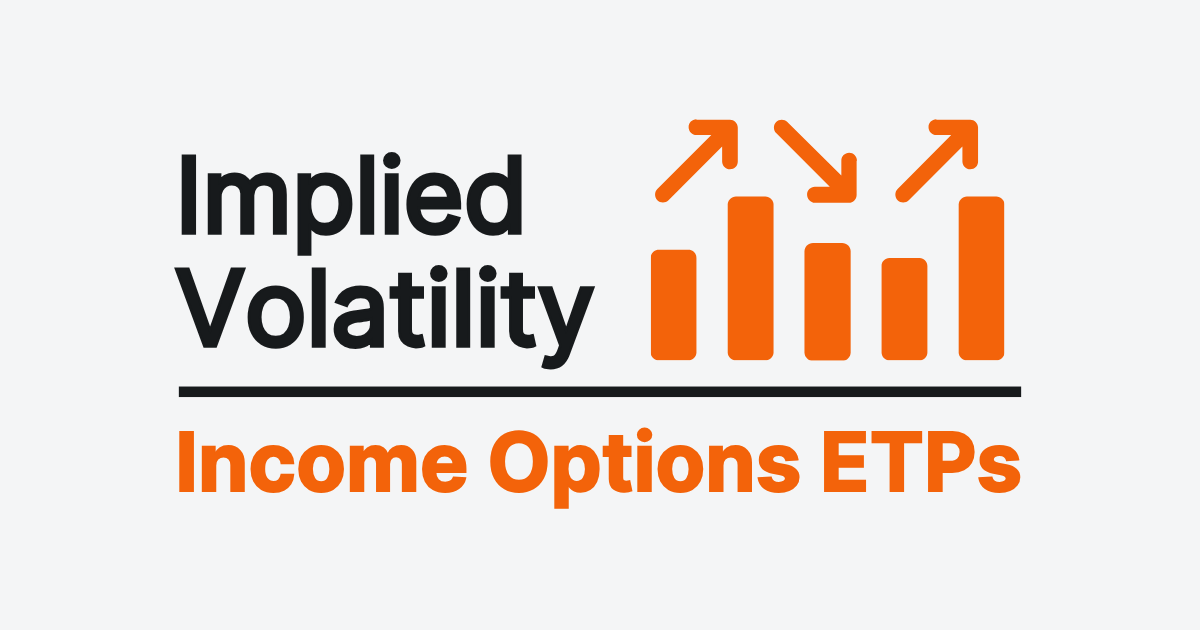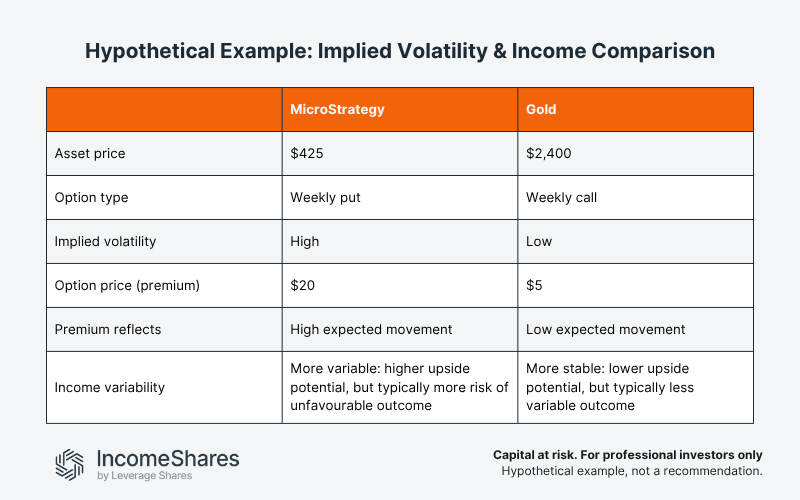.webp)
Auteur
Jonathan Hobbs, CFA
Date
22 Jul 2025
Catégorie
Market Insights
How Implied Volatility Affects Income Options ETPs
Votre capital est exposé à un risque si vous investissez. Vous pouvez perdre la totalité de votre investissement. Veuillez consulter l’avertissement complet sur les risques ici

IncomeShares exchange-traded products (ETPs) aim to generate income by selling options – and option prices change all the time. One of the biggest drivers of that change is implied volatility (IV). This guide breaks down the impact of IV on income options ETPs.
What is implied volatility?
Implied volatility (IV) shows how much the market “thinks” an asset might move over a given period. It doesn’t predict direction – just the expected size of the move. Higher IV means traders expect bigger swings. Lower IV means they expect less movement.
Unlike historical volatility, which looks at past moves, IV updates in real time. It reflects what the market expects now – not what’s already happened.
IV comes from the price of options traded in the market. The more movement traders expect, the more chance an option could finish profitable (“in the money”). That makes the option more valuable – and investors are typically willing to pay more for it.
Note: We don’t guess IV – we calculate it by backing out the value from a pricing model like Black-Scholes. The higher the option price, the higher the IV must be to justify it in the model.
How implied volatility affects income options ETPs
When IV is high, options prices (premiums) tend to rise, and the ETP may earn more income. When IV is low, premiums tend to drop – and the ETP may collect less. This makes implied volatility a key driver of income potential in income options ETPs.
Volatility changes by stock, sector, macro outlook, and news flow. For example, a stock’s volatility might spike ahead of earnings and drop once results are out. That may create variability in the income these ETPs generate month to month.
Higher implied volatility may boost income potential – but it also raises risk. Bigger price swings increase the chance that an option finishes either in the money or far out of the money (unprofitable). That can lead to stronger income in some cases – or weaker results in others.
The strategy adjusts to this using strike price selection and exposure levels, but income still depends on where the market lands.
Hypothetical example: MicroStrategy vs gold
Higher implied volatility – MicroStrategy (MSTR): Let’s say MicroStrategy is trading at $425. In a volatile week (e.g. around earnings), implied volatility rises. The IncomeShares MSTR Options ETP sells weekly put options on MicroStrategy stock. Those options might be priced at $20 – reflecting the higher expected movement of the stock.
Lower implied volatility – Gold: Now take gold, trading around $2,400. In a quiet week with no major news or events, implied volatility may be lower. The IncomeShares Gold Options ETP sells weekly call options, but the option prices might be just $5 – reflecting calmer market expectations.

Key takeaways
- Implied volatility affects how much an options-based ETP might earn. Higher IV often means higher premiums.
- But higher IV also brings more risk – bigger swings mean more chance of extreme outcomes.
- IncomeShares strategies aim to adapt to market conditions, but income still depends on where the market lands each month.
Votre capital est exposé à un risque si vous investissez. Vous pouvez perdre la totalité de votre investissement. Veuillez consulter l’avertissement complet sur les risques ici
Produits associé:
Stratégie
Covered call
Rendement des
distributions
13.21%
Stratégie
Cash-Secured Put + Equity
Rendement des
distributions
138.17%
